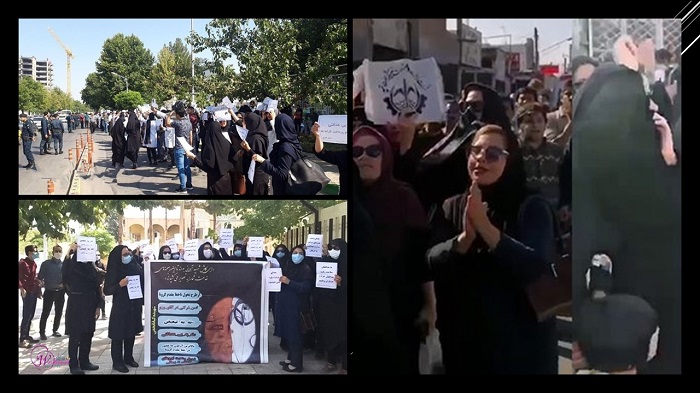
For the past few weeks, there have been significant strikes and protests taking place in Iran. Most of these strikes have been in the oil and petrochemical sector. They have now been joined by other sectors of society including women, nurses, teachers, and other workers.
There is a general air of discontent in society as the people continue to battle with pre-existing issues such as poverty, poor and uncertain working conditions, low pay, withheld salaries, and so on, as well as the Coronavirus pandemic that is still running rampant across the country.
August 13 – Mashhad, northeast #Iran
Hospital nurses protesting unfair practices in paying their paychecks & officials refusing to implement nursing laws.
This gathering was held outside the Razavi Khorasan province governorate.#IranProtests pic.twitter.com/R9hJOeDIg4— People’s Mojahedin Organization of Iran (PMOI/MEK) (@Mojahedineng) August 13, 2020
The strikers and protesters are also joined by clients of corrupt financial institutes that have been defrauded by the regime.
Protests and strikes have been held the whole way across the country in several cities including capital city Tehran, and also Rasht, Yazd, Mashhad, Urmia, Ahvaz, Shush, and Khomeini among others.
Many women participated in the nurse’s strikes, protesting the high number of nurses hired by private companies who then lost their jobs during the COVID-19 pandemic. The nurses and other healthcare workers protested outside official and governor buildings in several provinces, including in Yazd, the Central Province, Razavi Khorasan, Khuzestan, Kerman, West Azerbaijan, and Lorestan. The nurses and healthcare workers were calling on the government to remove the role of the private companies and to provide them with jobs via the country’s Ministry of Health.
#IranProtests
Nurses in #Mashhad city, NE #Iran, held a rally protesting officials for not paying their salaries and pensions.#IranAngels are subjected to the regime’s inattention despite they are in the frontline fight against #coronavirus.
Link?https://t.co/goGk8o0xAB pic.twitter.com/0THSiEWvk5— IranNewsUpdate (@IranNewsUpdate1) August 14, 2020
The involvement of private companies has been disastrous and highly unequal. Nurses hired officially or with proper working contracts normally earn between 5 to 7 million tomans, whereas the same workers hired by private companies only get between 2 and 3 million tomans. The private companies also denied workers the benefits laid out in National Services Management Law and they have also refused to pay them the special bonuses that make a huge difference in the lives of these low-paid workers.
On the same day, teachers held protesters, as well as educators that are part of the Literacy Movement, protested. Many gathered outside the parliament building in the country’s capital. These workers should have been hired by the Ministry of Education by now, but they have faced discrimination and are expected to jump through hoops before being properly employed. For example, they have been asked to take an exam.
Shockingly, six thousand educators were not able to pass the exams, destroying prospects for many who are advancing in age. The Iranian Resistance, the People’s Mojahedin Organization of Iran (PMOI / MEK Iran), drew attention to the case of the mother of four Ms. Tayyebeh Sharifi who committed suicide because she failed the exam.
Sadly, suicides like these are happening all over the country because of extreme poverty. Many suicides are committed by women who find themselves in an impossible situation, often related to financial issues.
The NCRI Women’s Committee reported on the suicides of young women in Iran. Their report said: the women described took their own lives during the last thirty days because they felt they had no other choice. Their stories are all too common under the mullahs’ regime. The MEK is committed to fighting for a free Iran where women have choices other than suicide or forced marriage
The adolescent suicide rate is about 20 percent of the total suicide rate in Iran. And 75 percent of suicide attempts are between the ages of 15 and 34. What is the reason for this rate of suicide of adolescents and young people in Iran?#Iranhttps://t.co/4KXi7GJ6cP
— Heshmat Alavi (@HeshmatAlavi) August 12, 2020
Teachers in Yazd gathered outside the Governor’s building in the city and they too were protesting against the lack of permanent contracts that have been awarded, with many teachers that have been working for many years. Around half of these workers are women.







